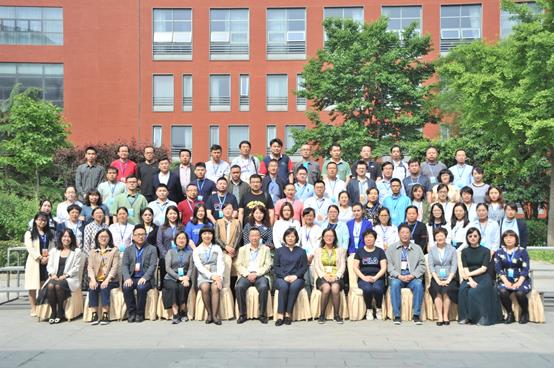 From 14-17 May 2019, the Open University of China (OUC) held a training class for key teachers from the computer major with the aim of strengthening the construction of the teaching team of its computer majors, advancing the professional development of teachers, and improving the teachers’ general ability. Over seventy teachers from computer majors in OUC branches attended the training and completed the studies. Lin Yu, OUC vice president, delivered a summary speech and granted completion certificates to the trainees.
From 14-17 May 2019, the Open University of China (OUC) held a training class for key teachers from the computer major with the aim of strengthening the construction of the teaching team of its computer majors, advancing the professional development of teachers, and improving the teachers’ general ability. Over seventy teachers from computer majors in OUC branches attended the training and completed the studies. Lin Yu, OUC vice president, delivered a summary speech and granted completion certificates to the trainees.

The training class consisted of political education for the computer curriculum, expert reports on hot issues in computing, the applications of big data in enterprises, and the sharing of teaching achievements. Yuan Wei, deputy director of the OUC Faculty of Science and Engineering, gave a welcome speech and a report titled “Teaching Reform of Engineering Disciplines in the New Era,” which offered an in-depth description of the development of engineering disciplines, in particular, the computer major, from five aspects: summary and reflection, common understanding, innovation, value recognition, and services and needs. Wang Xin, dean of the School of Computer Science and Technology, introduced the construction of the computer major in recent years. Professor Wang Li gave a report on graduation design and implementation for students of computer science and technology.
Professor Chen Ming from China University of Petroleum gave a report titled “Big Data Technology and Artificial Intelligence,” in which he explained the status quo, research focus, and cutting-edge developments in the field of big data and artificial intelligence. Professor Cao Yongcun from Minzu University of China shared his teaching practice and research results regarding classroom teaching and fostering morality to cultivate learners and political education. In terms of the applications of brand new technologies, Wang Decheng from Shuqing Education gave a report titled “Chances and Challenges in the Era of Data Intelligence,” in which he discussed the chances and challenges of the era of data intelligence via real case studies. Su Wentao from Ruijie Networks presented cloud desktop solutions for the education area in combination with Internet Plus.
Experience exchanges were arranged ar the training, which was actively joined by teachers such as Wang Yi from the Wuhan branch, Cheng Min from Jiangsu Open University, Yang Jianhua from the Anhui branch, and Liu Qing from the Hunan branch. Discussions about aspects of curriculum teaching, exam reform, resource construction, and teacher team construction were held and rich results have been achieved.
In his summary remarks, OUC vice president Lin Yu pointed out the three trends facing the development of open education: firstly, the development of continuing education is conducive to the development of the OUC; secondly, the boundary between adult education and vocational education is becoming blurred, which will create new pressures; thirdly, society and the education authorities have placed increasingly higher requirements on education quality. These trends will influence us to change the direction of teaching and education reform and it is expected that we should seize upon such trends.
A satisfaction survey was conducted at the end of training. 98% of the trainees were satisfied with the training in terms of the design, content, and services. They unanimously agreed that they learnt a lot from the training as it not only applied to OUC practice but also kept up with the latest issues and cutting edge disciplines. Political education for the curriculum of the major was well illustrated and provided new ideas for the teachers to foster morality through curriculum teaching. The training broaden the teachers’ horizon in terms of the computer major, brought them closer to the frontline of science, and enabled them to learn from each other’s experiences. In addition, a investigation has been made into the need to launch the Computer major in local schools of computer science and technology as well as the content and format of teacher training.
By Wang Jiao, Wang Li, OUC